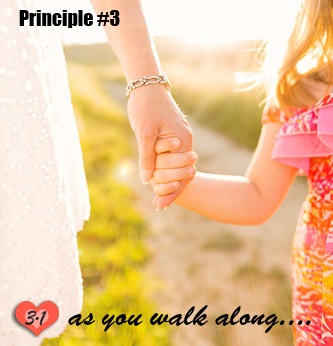
In our last post we began to look at the how of communicating the goodness and holiness of our sexuality. We saw that it’s not “the talk” but lots of “talks” in the messiness of everyday life as it comes up.
We’re now going to tease this out a little bit in three short posts.
Be there and be first!
Since most our conversations about sexuality will come from answering questions/dealing with situations as they arise we need to be askable parents. I don’t think I know of any parents who didn’t inwardly baulk when their child asked them something about sexuality. But believe me: it’s far easier answering them when they’re little rather than having this conversation for the first time when they’re teenagers. Just take a deep breath, pray for wisdom and talk as naturally and as matter of fact as you can.
However, sometimes certain topics don’t come up – whether because the child hasn’t thought about it or because they are shy and don’t like asking. In which case we as parents need to initiate a conversation. A simple way to do this is to say something like “when I was your age I used to wonder about…” or “when I was your age I used to worry about…”.
Don’t assume that no questions means that your child is not thinking about things!*
It might be worth drawing up a checklist of topics that your want to cover with the ages that you feel are appropriate (yes really! I’ll do one at some point in the future to share). Then you can tick them off as you cover them. This is important because ideally we want to be the ones giving the first message about sexuality. So in the UK children will get the “plumbing” science lesson about sexual organs in Year 7 so it needs to be covered by then at the very latest. Otherwise we have to undo a lot of confusion.
A simple example that really brought this home to me was when one of my children listened to Jonathan Park story about aliens which used the bible to prove (yes really!) that they couldn’t exist. They were adamant that this was true – as it was the first message they had heard.
So let’s ensure that the first message they hear about sexuality is about how special it is because it reflects God’s glory!
Think about your own experience of this:
When did you first hear about sex? What was the message portrayed?
OK. Now it’s your turn to practise being an askable parent by answering this tricky question I received from one of my children.
Dad, why does my willy get hard sometimes?
Talks not “the talk”
We’ve already mentioned in this post and the last one that we respond to questions as they arise and give answers that are not only godly but also age-appropriate. So we won’t ever have “the talk” but lots of little talks.
It may be tempting also to breathe a sigh of relief after you’ve “covered” a topic but repetition is important. Children will ask the same questions again for reassurance and also we can never be sure that they’ve actually learnt what we’ve said.
I learnt this the hard way. We worked so hard with our oldest child on giving godly responses to the many questions she asked when she was young and we’d covered all the topics so I secretly congratulated myself on a job well done. However, it turns out in conversation with her some years later that she had forgotten everything we had said and because she was older and bit more shy about these issues (especially so since we hadn’t been talking about them because we thought we were done) – she stopped asking us and started asking others instead. Hence she started all sorts of contradictory ideas.
Stories are better than facts/rules/morals
Facts are dry and don’t engage the soul whereas stories draw you in and teach concepts in a much deeper way than ever “objective” facts could hope to do. This is the Hebrew way of life – sharing their collective story with their children, for example the Passover meal (Ex 12:24-27) or telling stories of why memorial stones are placed there (Josh 4:2-7). Much of the Bible is written as narrative/story and Jesus taught ideas through parables/stories (eg “what should I do to inherit eternal life?” Lk 10:25-37). A story invites our participation whether it’s true or fictional.
For example, one of our girls was flirting with a boy who was, quite frankly, treating her appallingly. But she just couldn’t see this. So I made up a story called “The Princess and the Crocodile” where a princess who loves pets wants a crocodile but her father refuses saying it won’t be a good pet because it won’t love her back. So she decides to go to the river and well, let’s just say her father had to rescue her from a sticky situation…
Our children also view any stories about us (especially about when mummy and daddy were courting) as something extra special and so they are powerful messages.
However, it isn’t always appropriate to share specifics so we may say something like “before I was a Christian I made some wrong choices about…which I regret now and so I want to make sure that you don’t make the same mistakes I did”
But just like we talked about in our post about godly parenting, we don’t have to be perfect. We just have to point to a perfect saviour. For example: “I struggled with that too…but God helped me…”
This is easier said than done, particularly if you have shame about something. Like Adam and Eve we want to cover it up but still want to prevent our children from making that same mistake. However, what will happen is that we’ll simply end up preaching at them which will turn them off and will then cause them to repeat the same mistakes as us! The only way to break the cycle is confession to God and then humility to our children!
Here’s some questions for personal reflection:
Think of a story that your parents told about themselves before they were married.
What effect did this have on you?
Is there something sexual that you did that you now regret?
Confess it to your Father and receive His forgiveness and healing.
How can you communicate this mistake to your children in a sensitive way that will help them to break the cycle?
Now let’s see if we can apply this principle to helping our children:
Think of a story from your life that you can share with your children about:
- A worry you had about your body when growing up
- A hard lesson you learnt about sexuality being holy/about character
I hope you’ve found this post helpful. Feel free to share any comments, stories or experiences below.










 Welcome to the last post of our basic course “teach your children godly sexuality”. We have looked at four principles:
Welcome to the last post of our basic course “teach your children godly sexuality”. We have looked at four principles: We’re on the last of our four principles in our current series on our basic course of “teach your children godly sexuality”.
We’re on the last of our four principles in our current series on our basic course of “teach your children godly sexuality”. Today we blog the last of our four principles from our basic course of “teach your children godly sexuality”.
Today we blog the last of our four principles from our basic course of “teach your children godly sexuality”.